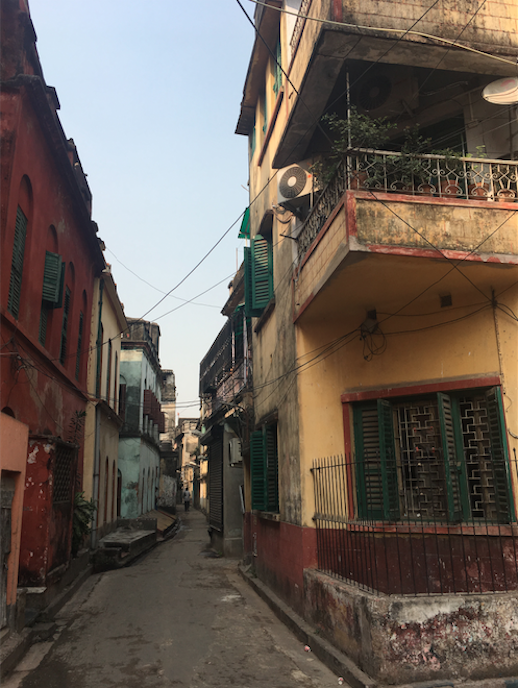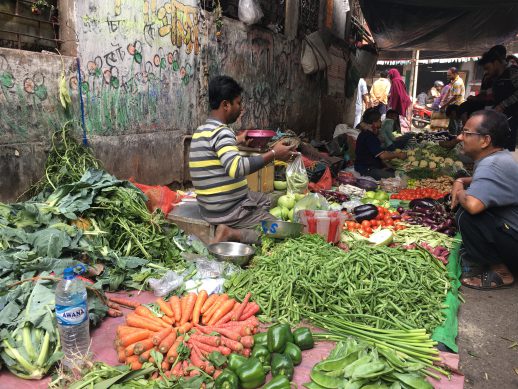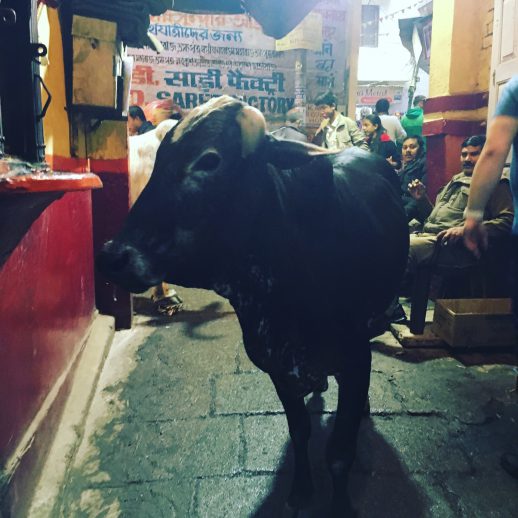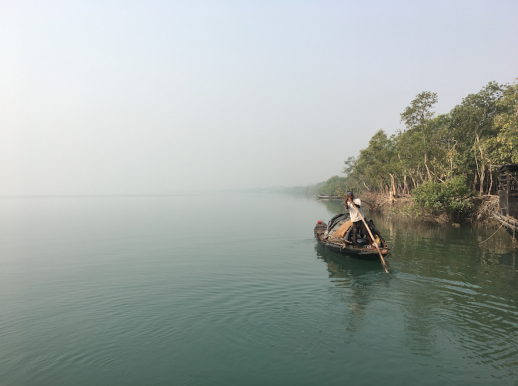Poet Sophie McKeand on dreaming and birdsong between Wales and India
It’s late February and I’m absorbed by the bright-berried Cotoneaster Cornubia tree/bush outside our home-office window shivering in the Welsh winter grey under the weight of rummaging house-sparrows. Watching them transports me back to the previous week and a sharp memory of being hustled at the roadside under an intense quarrel of slim-line sparrows in the Kolkata heat where I was thinking about Terry Gilliam.
I’ve been fascinated with steampunk since first seeing Gilliam’s dystopian film Brazil and am reminded of this because of the dust-covered buildings, dizzying streetmarkets and Victorian-esque machinery that clash loudly with, and stagger grandiosely alongside, high-tech phone stores, elaborate architecture and brightly lit billboards for expensive jewellery.
Our guide strides confidently through the old Bengali markets of Shobhabazar and I wilt in his wake – a Welsh snowdrop in this unseasonably warm winter. Nobody here denies climate-change; even the taxi drivers will give this as the reason for India’s year-round heat. We breathe in a no-man’s-land of disjointed buildings that vibrate with intelligible shouts from stallholders in Bengali or Hindi. Fragments of the words of the Greek philosopher Heraclitus whirl like finches in the mind because nowhere is it more apparent than the cities of Bengal that everything is in a constant state of movement. Buildings rise and fall like a broken ribcage and the people take as much notice as the Kolkata crows that course in a steady stream along knotted streets.
I was told India’s vibrant colours would envelop the senses, that her bright saris and temples and shrines to the gods are almost overwhelming in their visual potency, and I can understand why this is but the sense I was most struck by time and again was the sound of the country – her musicality, her melody; her shrieks and sighs.
City skies from New Delhi to Kolkata explode with the nattering of sparrows, the rough burr of crows and the long, low whistle of black kites – a cacophony that fights to be heard over the urgency of car horns. In the UK I might use the horn a couple of times a year and then in anger but the Indian car horn is an altogether different beast shrieking incessantly ‘I am here!’ ‘Move away!’ ‘Stop now!’ ‘Go! Go!’ ‘You’re in my lane!’ ‘I’m in your lane and I’m not going to move!’. It is a language I would fear to learn.
In the holy city of Varanasi the waxing moon is a hammock and I am Alice, fallen down the rabbit-hole into an oddly strange-yet-familiar land where sacred bulls wade freely through tight alleys because they are a living representation of Nandi who serves the god Shiva. I wake in darkness at 5.30am to rolling bells and a woman chanting through loudspeakers. Men dressed in red robes weave fire torches before The Ganges as the sun rises in answer to their summons. We climb through this liminal space onto a rowing boat where the crease of oars counts time along the Ghats and bodies are bathed, or cremated. The river flows on indifferent and I think of Rabindranath Tagore’s poem ‘Paper Boats’: Day by day I float my paper boats one by one down the running stream. / In big black letters I write my name on them and the name of the village where I live. / I hope that someone in some strange land will find them and know who I am.
The holy river gifts purpose to boat and bird – Indian pond herons and common myna birds with fast fire flash eyes bob while tenacious white gulls devour spirit offerings cast from boatsides. It begins to dawn on me that I’m becoming less drawn to the trees of a place and more to the birds. Perhaps this is because, after a decade rooted in the community, I’m unwinding roots from earth, growing wing and feather, beak and claw.
The land in India has a tangible love for the people that is unlike anything I’ve felt in the UK or Europe. Perhaps this is because so many in India remain living in close contact with her, or because the people still honour the old gods regularly with ritual and ceremony.
Two dreams manifest as we journey on overnight trains that tch-ah tch-ah tch-ah across the Bengali landscape:
In the first, I’m visited by a mysterious peddler who gifts a magic biscuit. As I chew and swallow luminous flowers force their way out of every orifice as well as from palms, soles and the top of the head. I wake thinking of Blodeuwedd, the mythical Welsh woman of flowers and vow to revisit her story.
The second dream is a lake that boils with fish – as the larger fish silver their way to the surface the much smaller fish unhook jaws and begin swallowing the giant fish whole in the way of the boa constrictor.
The Sundarbans is another world entirely. The water’s silence is smooth and round like a well-worn river stone, chipped only by the occasional flap of a great egret’s wing or my shriek upon spotting an elusive serpent eagle settled in a mangrove tree.
Here the kingfisher is abundant – we see seven of nine species on the first day with black capped, collared and common kingfishers flashing often across the boat to our collective whoops and sighs, but I don’t have a clear memory of seeing one in Wales. In the mid-afternoon Bengali heat I conjure a Welsh riverside and try to place the kingfisher in this scene but still cannot remember seeing one in the wild – and cannot remember not. The memory is as opaque as the pale green water we float on. The Welsh kingfisher remains a vision threaded into the fabric of thoughts and I vow to write them at home in the hope of a visit – if only in dreams.
*
More about this journey can be found on the Wales Arts Review blog. Dharma, a poem written on the overnight train from Varanasi to Kolkata, is here.
The Wales/India project that this cultural exchange is part of is supported by Parthian Books, Wales Arts International, British Council Wales, Literature Wales and Wales Arts Review. Part of the project involved an onstage appearance at the Kolkata Literature Festival.
Sophie’s poetry collection Rebel Sun – a collection of starlings and socialism – is out with Parthian Books in June 2017. Pre-order the book here, along with some limited-edition creative extras.




